Ertach Kernow - Kings and Cornwall's History
Kings and Cornwall's history is perhaps a topic worth looking at following this past week, which has been full of pomp and ceremony and celebration of the coronation of King Charles III. Looking at the other mainland Celtic nations of the United Kingdom Scotland and Wales two short paragraphs to illustrate how they were both integrated into what became Great Britain.
Scotland was integrated within Great Britain, firstly through the crown by James VI of Scotland also becoming James I of England in 1603 following the death of Elizabeth I of England. His attempts to unite Scotland to England and Wales would continue for a century. Negotiations eventually met with approval both sides of the border and the Act of Union brought the Kingdom of Great Britain into being on 1 May 1707.
Wales was first briefly united under Gruffydd ap Llywelyn, who ruled as King of Wales between 1057 and his death in 1063. Conquest by the Normans and continued by later English kings, Wales would eventually be brought under England control by Edward I and the death of the last Welsh Prince of Wales, Llywelyn ap Gruffudd in 1282. The revolt led by Owain Glyn Dŵr from 1400 led to a brief fifteen years of Welsh independence. Acts of Parliament during the reign of Henry VIII imposed English law on Wales including the Act of Uniformity.
Cornwall seems to have evolved into a proto nation during the 6th century ruled by a number of local kings some of which have been recorded. For early mentions of Cornwall, one must look to the Anglo-Saxon Chronicles and Welsh Annals. Nine Anglo-Saxon Chronicles manuscripts survive wholly or partially, none of them original. The oldest was seemingly begun towards the final years of Alfred the Great’s reign in 899, with pre-Alfred entries compiled from earlier source material.
Since the Romans left Britain around 410CE there was a gradual takeover of the southern part of the island by Germanic tribes such as Friesians, Jutes, Angles, Saxons collectively known today as Anglo-Saxons. In time there would develop individual nations under their own rulers including smaller states such as Bernicia, Deira, Elmet and Hwicce and larger ones like Mercia, East Anglia, and Wessex. Gradually smaller states became integrated with larger the ones. We’re interested in Wessex as this bordered the Celtic tribal area known as Dumnonia that included Cornwall. From the late fifth century an exodus of Celtic peoples from the west to what was known as Armorica, took place. This later became Brittany, one of the acknowledged Celtic nations with its own Brythonic Celtic language and calls for independence.
The border between the Dumnonian tribes remained fluid for some time, but gradually after a number of battles the Celtic lands were pushed further west. It is during this period names of Cornish leaders, dukes and earls are mentioned by writers of the time. Of course, religion was a factor as the Anglo-Saxon nations became Christians leading to interaction between them and Christian Celtic nations. Celtic Christianity differed in many ways from the Roman church, largely relating to the calculation of Easter. The Synod of Whitby in 664 agreed that it would be the Roman way and gradually this was established throughout England. Cornwall was somewhat tardy in taking this up and Bishop Aldhelm addressed a letter of admonition to Geruntius the Cornish and Dumnonian king and bishops dated between 675 and 705.
It should be noted during this period Cornwall was referred to as West-Wales in historic texts and its history is tied to that of Wessex the neighbouring kingdom, and during the early 9th century its militaristically successful King Ecgberht. The year 813 was the Anglo-Saxon Chronicle’s first mention of Cornwall with the defeat of the Cornish by King Ecgberht. The translation reads ‘Ecgberht laid waste West-Wales from eastward to westward.’ However, he obviously did not control the land or the people and in 823 the chronicle notes ‘This year a battle was fought between the Welsh and the men of Devon’. An original translation says at Camelford more recently Galforda has been reinterpreted as being in west Devon. The year 835 was not a good one for Cornwall. The Anglo-Saxon Chronicle translation reads; ‘This year a great hostile fleet came to the West Wealas, and they united together, and made war upon Ecgberht king of the West-Saxons. As soon as he heard of it he went thither with an army, and fought against them at Hengeston, and there he put to flight both the Welsh and the Danish-men.’ It is from this point that historians consider Cornwall had become a client kingdom to Wessex, but not absorbed nor fully controlled. Records show that Cornish lands were dispersed by kings of Wessex however evidence shows that there were Cornish kings existing, thereby maintaining Cornwall as a nation albeit a vassal state. One can visit the monument raised to Dungarth or Doniert at St Cleer who drowned in 875.
Following Ecgberht death in 839, life was relatively quiet for Cornwall as his son and successor Æthelwulf was a very pious and unwarlike king. He is now considered to have been a successful ruler consolidating his lands and preparing the way for his sons, which included Alfred. This state of affairs continued through the reigns of Alfred’s brothers and Alfred’s own reign. The most imminent danger then was from Danish invasions that temporarily deprived Alfred of his kingdom, whilst he was hiding in the marshlands of Somerset. It has been suggested that the Vikings did a great service to Cornwall, not as allies, but as a distraction thereby preventing further control and colonisation.
Let’s now consider Æthelstan grandson of Alfred the Great and his impact upon Cornwall. There is no doubt that Cornwall was now fully controlled by Æthelstan who is considered to be the first king of all England. Records show that the Cornish were expelled from Exeter and Devon and laws set by Æthelstan made it unlawful for any Cornishman to own land, and lawful for any Englishman to kill any Cornishman in England. Harsh, but setting a difference between the English and Cornish peoples.
The Anglo-Saxon Chronicle records that in 926 ‘he (Æthelstan) ruled all the kings who were in this island: first, Huwal king of the West-Welsh’ then all of the other kings and their kingdoms were named and ‘they confirmed the peace by pledge, and by oaths, at the place which is called Eamot, on the 4th of the ides of July; and they renounced all idolatry, and after that submitted to him in peace.’ It was Æthelstan who set the border of Cornwall to the eastern bank of the River Tamar and as such acknowledged Cornwall as a separate nation, albeit one subservient to that of England. This can be seen as a positive move as it allowed the continued cultural integrity of Cornwall, one that would not be entirely lost, surviving and increasingly re-emerging today. Following Æthelstan’s death his successor Edmund I, styled himself 'King of the English and ruler of this province of the Britons', referring to Cornwall. This was a continuing theme and made clear that Cornwall was not included or formally incorporated into the English state. It was he who set up the system of administrative Hundred’s that were finally abolished in 1867.
The coming of the Normans would change land ownership but as far as culture and Cornish ethnicity little changed. There were powerful earls and in 1337 Cornwall was made a Royal Duchy.
The Italian cleric Polydore Virgil commissioned by Henry VIII to write a history of England wrote ‘The whole country of Britain is divided into four parts, whereof the one is inhabited by Englishmen, the other of Scots, the third of Welshmen, the fourth of Cornish people ... and which all differ among themselves either in tongue, either in manners, or else in laws and ordinances. Henry regarded Cornwall as a separate nation. At his coronation nine children riding horses representing each of Henry’s kingdoms including England, Wales, Ireland and Cornwall.
The Cornish would rise again in national revolt against the English crown in 1497 and again in 1548 due to grievances relating to taxation and religion as well as some lesser well-known rebellions. There were no laws instigated by the Tudor monarchy on Cornwall, unlike Wales. Over the coming centuries there was a gradual decline in the number of people speaking the Cornish language until almost lost by the 18th and 19th centuries. It seems that to most people Cornwall gradually slipped from a nation into what they saw as a county of England. This was perhaps due to the gentry being courted by English politicians during a time when Cornish parliamentary representation was disproportionately strong and being seen to be English speaking and England oriented was advantageous for political and business purposes. The Local Government Act of 1888, created the first Cornwall council in 1889 confirming Cornwall’s territorial boundaries, but tying it to an English ‘county’ system which became engrained and accepted within both Cornish and English peoples. This for many is the case today. However, with the 21st century acknowledgement of the Cornish peoples as an ethnic minority with equality with Scots, Welsh and Irish peoples and inclusion within the ‘Framework Convention for the Protection of National Minorities’, along with a resurgence in the Cornish language this is changing. There is greater understanding and feeling towards Kernow as a separate nation especially having never formally been assimilated as part of England as has Scotland and Wales.
Perhaps Cornwall should thank King Æthelstan for establishing a border and a meaningful devolution deal that will benefit Cornwall and its people will be realised within the reign of King Charles III.
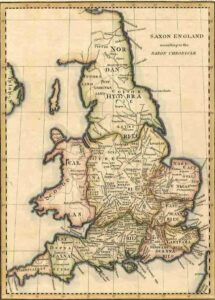
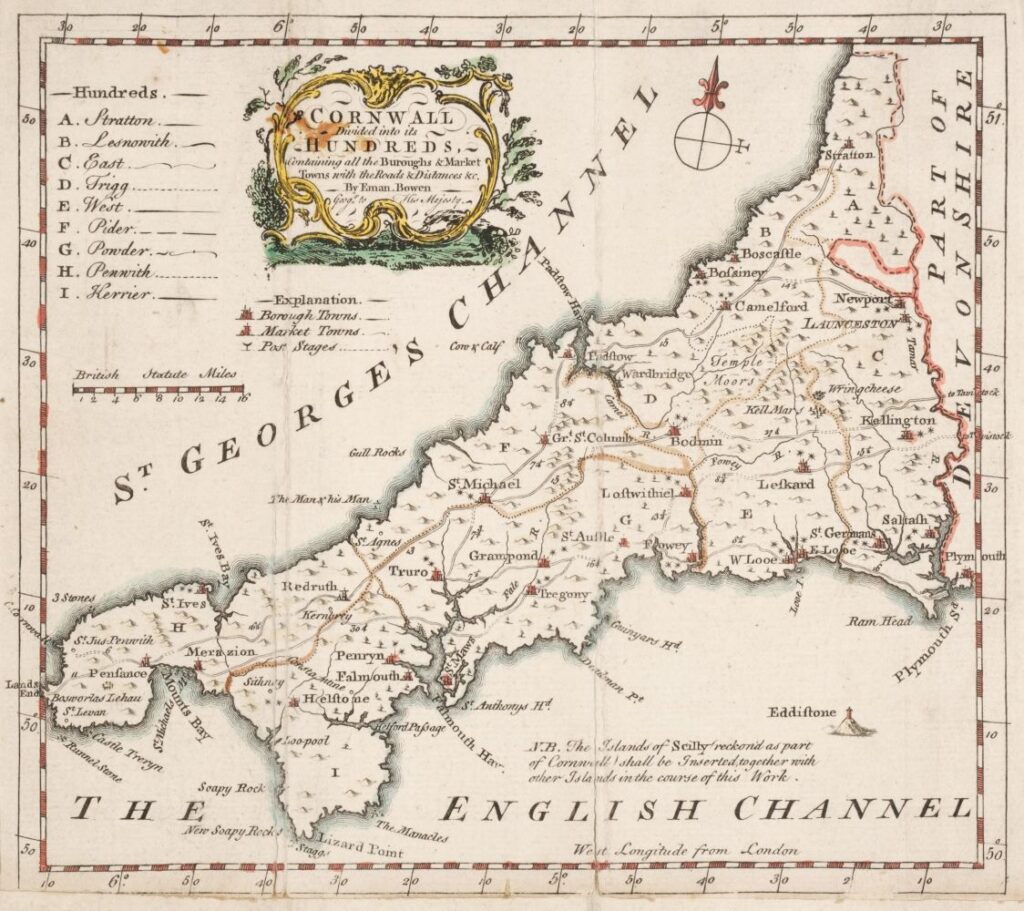
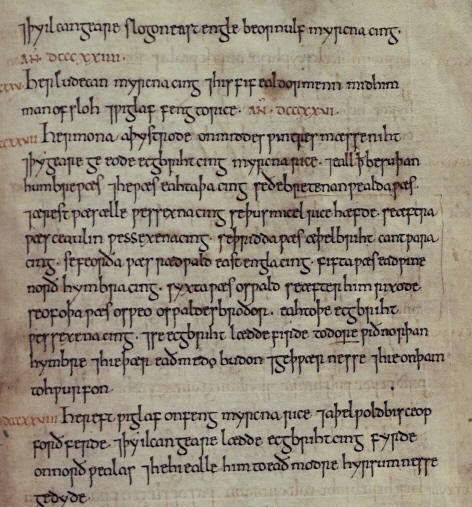
![King Doniert's & Other Half Stone's [2] King Doniert's & Other Half Stone's](https://www.cornwallheritage.com/wp-content/uploads/2021/12/King-Donierts-Other-Half-Stones-2.jpg)
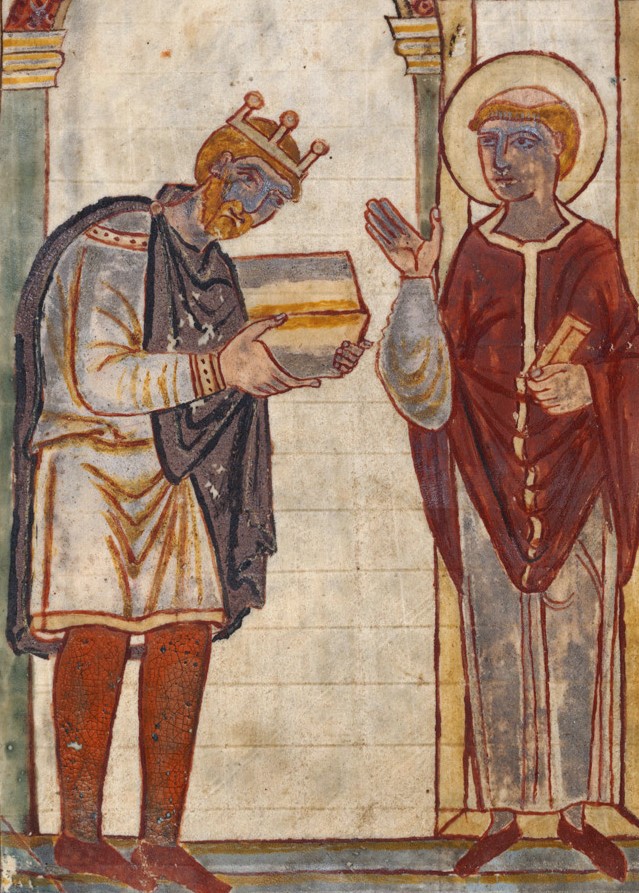
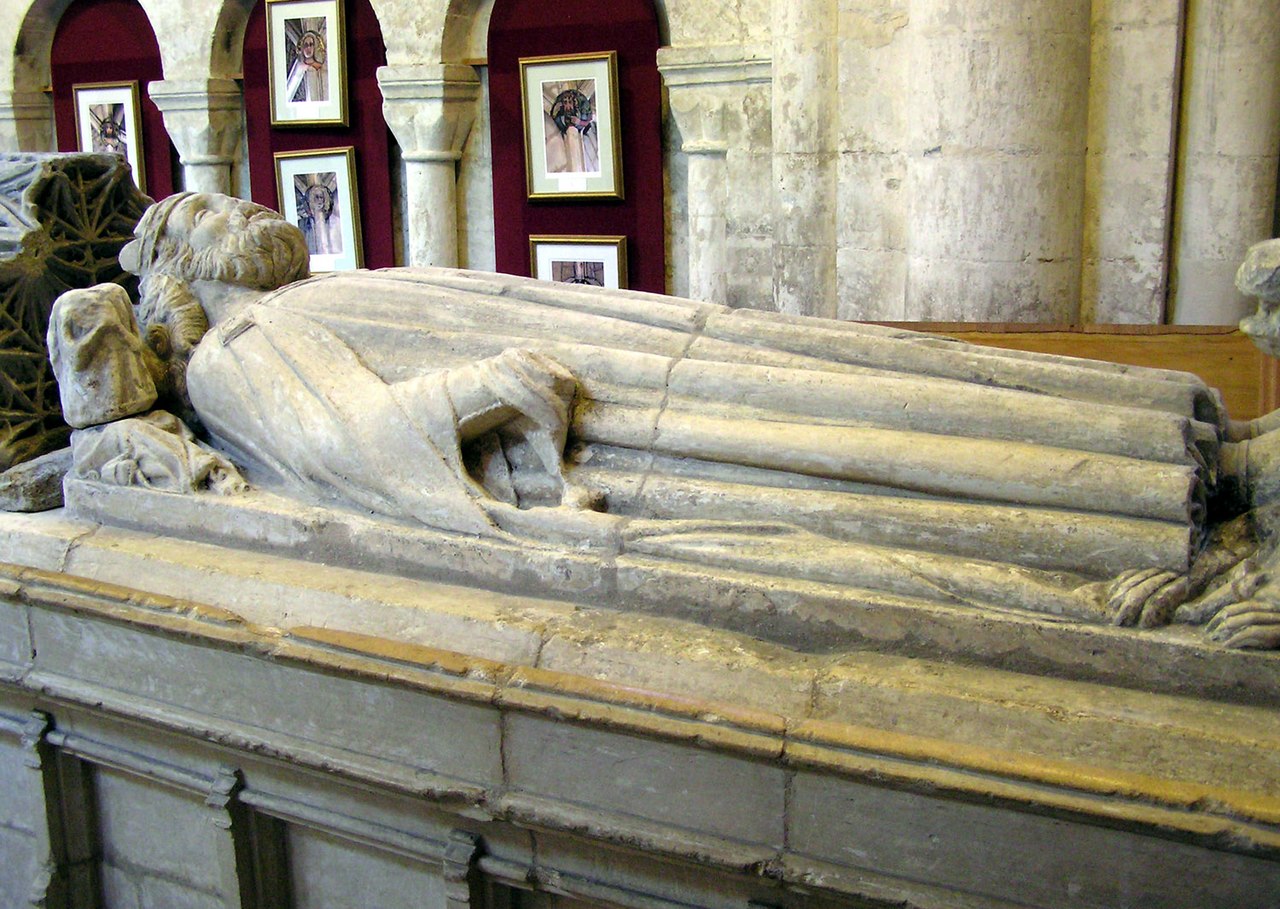

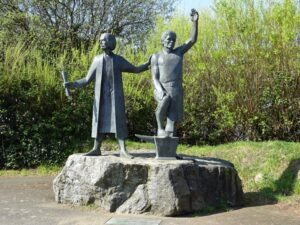

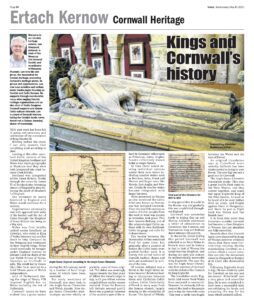
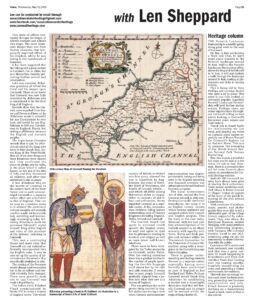
![[150] Ertach Kernow Heritage Column - 10th May 2023 - Various Ertach Kernow Heritage Column - 10th May 2023](https://www.cornwallheritage.com/wp-content/uploads/2023/05/150-Ertach-Kernow-Heritage-Column-10th-May-2023-Various-285x300.jpg)